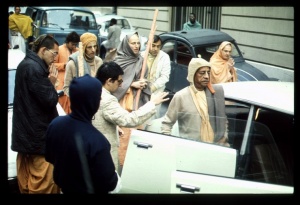SB 4.1.24: Difference between revisions
m (1 revision(s)) |
No edit summary |
||
| Line 1: | Line 1: | ||
{{info | {{info | ||
|speaker=Maitreya | |speaker=Maitreya Ṛṣi | ||
|listener=Vidura | |listener=Vidura | ||
}} | }} | ||
[[Category:Srimad-Bhagavatam - Canto 04 Chapter 01]] | |||
[[Category:Bhagavatam Verses Spoken by Maitreya Rsi - Vanisource|040124]] | |||
<div style="float:left">'''[[Srimad-Bhagavatam]] - [[SB 4|Fourth Canto]] - [[SB 4.1: Genealogical Table of the Daughters of Manu|Chapter 1: Genealogical Table of the Daughters of Manu]]'''</div> | |||
<div style="float:right">[[File:Go-previous.png|link=SB 4.1.23]] '''[[SB 4.1.23]] - [[SB 4.1.25]]''' [[File:Go-next.png|link=SB 4.1.25]]</div> | |||
{{RandomImage}} | |||
==== TEXT 24 ==== | ==== TEXT 24 ==== | ||
<div | <div class="verse"> | ||
praṇamya daṇḍavad bhūmāv | :praṇamya daṇḍavad bhūmāv | ||
upatasthe 'rhaṇāñjaliḥ | :upatasthe 'rhaṇāñjaliḥ | ||
vṛṣa-haṁsa-suparṇa-sthān | :vṛṣa-haṁsa-suparṇa-sthān | ||
svaiḥ svaiś cihnaiś ca cihnitān | :svaiḥ svaiś cihnaiś ca cihnitān | ||
</div> | </div> | ||
| Line 16: | Line 22: | ||
==== SYNONYMS ==== | ==== SYNONYMS ==== | ||
<div | <div class="synonyms"> | ||
''praṇamya''—offering obeisances; ''daṇḍa-vat''—like a rod; ''bhūmau''—ground; ''upatasthe''—fell down; ''arhaṇa''—all paraphernalia for worship; ''añjaliḥ''—folded hands; ''vṛṣa''—bull; ''haṁsa''—swan; ''suparṇa''—the Garuḍa bird; ''sthān''—situated; ''svaiḥ''—own; ''svaiḥ''—own; ''cihnaiḥ''—by symbols; ''ca''—and; ''cihnitān''—being recognized. | |||
</div> | </div> | ||
| Line 23: | Line 29: | ||
==== TRANSLATION ==== | ==== TRANSLATION ==== | ||
<div | <div class="translation"> | ||
Thereafter he began to offer prayers to the three deities, who were seated on different carriers—a bull, a swan and Garuḍa—and who held in their hands a drum, kuśa grass and a discus. The sage offered them his respects by falling down like a stick. | Thereafter he began to offer prayers to the three deities, who were seated on different carriers—a bull, a swan and Garuḍa—and who held in their hands a drum, kuśa grass and a discus. The sage offered them his respects by falling down like a stick. | ||
</div> | </div> | ||
| Line 30: | Line 36: | ||
==== PURPORT ==== | ==== PURPORT ==== | ||
<div | <div class="purport"> | ||
Daṇḍa means "a long rod," and vat means "like." Before a superior, one has to fall down on the ground just like a stick, and this sort of offering of respect is called daṇḍavat. Atri Ṛṣi offered his respect to the three deities in that way. They were identified by their different carriers and different symbolic representations. In that connection it is stated here that Lord Viṣṇu was sitting on Garuḍa, a big aquiline bird, and was carrying in His hand a disc, Brahmā was sitting on a swan and had in his hand kuśa grass, and Lord Śiva was sitting on a bull and carrying in his hand a small drum called a ḍamaru. Atri Ṛṣi recognized them by their symbolic representations and different carriers, and thus he offered them prayers and respects. | ''Daṇḍa'' means "a long rod," and ''vat'' means "like." Before a superior, one has to fall down on the ground just like a stick, and this sort of offering of respect is called ''daṇḍavat''. Atri Ṛṣi offered his respect to the three deities in that way. They were identified by their different carriers and different symbolic representations. In that connection it is stated here that Lord Viṣṇu was sitting on Garuḍa, a big aquiline bird, and was carrying in His hand a disc, Brahmā was sitting on a swan and had in his hand ''kuśa'' grass, and Lord Śiva was sitting on a bull and carrying in his hand a small drum called a ''ḍamaru''. Atri Ṛṣi recognized them by their symbolic representations and different carriers, and thus he offered them prayers and respects. | ||
</div> | </div> | ||
__NOTOC__ | |||
<div style="float:right; clear:both;">[[File:Go-previous.png|link=SB 4.1.23]] '''[[SB 4.1.23]] - [[SB 4.1.25]]''' [[File:Go-next.png|link=SB 4.1.25]]</div> | |||
__NOTOC__ | |||
__NOEDITSECTION__ | |||
Revision as of 12:14, 4 May 2021

A.C. Bhaktivedanta Swami Prabhupada
TEXT 24
- praṇamya daṇḍavad bhūmāv
- upatasthe 'rhaṇāñjaliḥ
- vṛṣa-haṁsa-suparṇa-sthān
- svaiḥ svaiś cihnaiś ca cihnitān
SYNONYMS
praṇamya—offering obeisances; daṇḍa-vat—like a rod; bhūmau—ground; upatasthe—fell down; arhaṇa—all paraphernalia for worship; añjaliḥ—folded hands; vṛṣa—bull; haṁsa—swan; suparṇa—the Garuḍa bird; sthān—situated; svaiḥ—own; svaiḥ—own; cihnaiḥ—by symbols; ca—and; cihnitān—being recognized.
TRANSLATION
Thereafter he began to offer prayers to the three deities, who were seated on different carriers—a bull, a swan and Garuḍa—and who held in their hands a drum, kuśa grass and a discus. The sage offered them his respects by falling down like a stick.
PURPORT
Daṇḍa means "a long rod," and vat means "like." Before a superior, one has to fall down on the ground just like a stick, and this sort of offering of respect is called daṇḍavat. Atri Ṛṣi offered his respect to the three deities in that way. They were identified by their different carriers and different symbolic representations. In that connection it is stated here that Lord Viṣṇu was sitting on Garuḍa, a big aquiline bird, and was carrying in His hand a disc, Brahmā was sitting on a swan and had in his hand kuśa grass, and Lord Śiva was sitting on a bull and carrying in his hand a small drum called a ḍamaru. Atri Ṛṣi recognized them by their symbolic representations and different carriers, and thus he offered them prayers and respects.